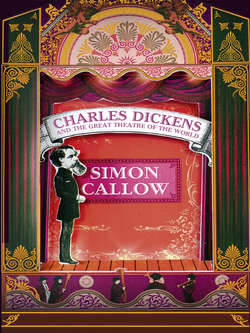Charles Dickens and the Great Theatre of the World

Реклама. ООО «ЛитРес», ИНН: 7719571260.
Оглавление
Simon Callow. Charles Dickens and the Great Theatre of the World
Charles Dickens and the Great Theatre of the World. Simon Callow
Dedication
Contents
FOREWORD
OVERTURE
ONE. Paradise
TWO. Paradise Lost
THREE. Beginning the World
FOUR. The Birth of Boz
FIVE. The Peregrinations of Pickwick
SIX. Practical Power
SEVEN. Here We Are!
EIGHT. Sledge-Hammer Blow
NINE. Animal Magnetism
TEN. Every Man in His Humour
ELEVEN. The Great Fight and Strife of Life
TWELVE. Not So Bad as We Seem
THIRTEEN. The Ice-Bound Soul
FOURTEEN. Going Public
FIFTEEN. The Loadstone Rock
SIXTEEN. On the Ground
ACKNOWLEDGEMENTS
SELECT BIBLIOGRAPHY
SEARCHABLE TERMS
Copyright
About the Publisher
Отрывок из книги
This book is dedicated to a friend whose loss
only gets worse with the passing years, Simon
.....
As if to confirm this, his father – who had been so very little use to him since they had come to London – was now finally arrested for debt and taken to the sponging house, a sort of clearing house, prior to being formally committed to the Marshalsea Prison. During the hours when he was not tying pieces of string round pots of polish and sticking printed labels onto the jars, he ran errands for his father, delivered, as Forster says, ‘with swollen eyes and through shining tears’, until at last John Dickens, unable to raise a single penny of collateral, was committed to debtors’ jail, breaking his son’s heart, Dickens reports, with the words that later emerged immortally from Wilkins Micawber’s mouth: ‘The sun has set upon me forever.’ Elizabeth and the rest of the family prepared to join him in the Marshalsea. The household furniture was sold for the family benefit. A sale was held at Gower Street North. ‘My own little bed was so superciliously looked upon by a Power unknown to me, hazily called “the Trade”, that a brass coal-scuttle, a roasting jack, and a birdcage, were obliged to be put into it to make a Lot of it,’ he wrote thirty years later, ‘and then it went for a song. So I heard mentioned, and I wondered what song, and I thought what a dismal song it must have been to sing!’
He was always hungry. He had to feed himself out of his six shillings a week: a pennyworth of milk and a cottage loaf for breakfast before he left Little College Street, and a small loaf and a quarter of a pound of cheese when he got back at night. The autobiographical fragment is filled with descriptions of meals dreamed of and food yearned after, with the occasional rash indulgence that left him short for the rest of the week, despite his hopeless attempts to divide his six shillings up, one for each day. He lounged about the streets, insufficiently and unsatisfactorily fed, he said. He bitterly missed family life, once so abundant, and loathed going home every night to what he called ‘a miserable blank’. He decided not to take it lying down, and confronted his father with it the following Sunday night, ‘so pathetically and with so many tears’ that, as Dickens, with or without irony, says, ‘his kind nature gave way’. Astonishingly, it seems never to have crossed John Dickens’s mind that Charles might be unhappy. It was the first time the boy had ever made any complaint about his situation, ‘and perhaps it opened up a little more than I intended’, he says. The lessons that he learned from this confrontation with John must have been deep: he saw that it was necessary to get his father to think about his child’s situation, to face up to it, to try to imagine what he was feeling. He was powerless, he knew, to act on his own behalf, but it was possible, he discovered, to shame his father into behaving like a parent.
.....